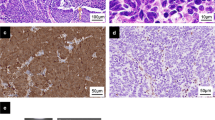Abstract
We examined the p53 protein and human papilloma virus (HPV) by immunohistochemistry and DNA ploidy by cytofluorometry in paraffin-embedded esophageal carcinoma tissue specimens. Sixty-one patients with superficial esophageal carcinoma were operated on between 1983 and 1991 without any prior treatment. Immunostaining of the anti-p53 protein antibody (CM1) was positive in 32 carcinomas (52%). Patients with p53-positive tumors had a poorer outcome than those with p53-negative tumors (P<0.05). In addition, patients with p53-positive tumors did not have any characteristic site of relapse. Only 5 of the 61 patients (8.2%) had HPV-positive tumors. One of these 5 carcinomas expressed both p53 protein and HPV. Three patients with HPV-positive tumors which had invaded the submucosal layer died of relapse. A determination of DNA ploidy revealed 30 patients with aneuploid tumors, 13 with polyploid tumors and 18 with diploid tumors. The outcome of the patients with aneuploid tumors was worse than that of the patients with diploid tumor (P<0.05). p53 protein expression was not associated with DNA ploidy; however, the 16 patients who had both p53-positive and aneuploid tumors had a worse prognosis than patients with p53-negative and aneuploid tumors (P<0.01). These findings suggest that p53 protein expression in conjunction with DNA ploidy may be a useful indicator in evaluating the prognosis of patients with superficial esophageal carcinoma.
Similar content being viewed by others
References
Kato H, Tachimori Y, Watanabe H, Yamaguchi H, Ishikawa T, Itabashi M (1990) Superficial esophageal carcinoma. Cancer 66:2319–2323
Sugimachi K, Ikebe M, Kitamura K, Toh Y, Mastuda H, Kuwano H (1993) Long-term results of esophagectomy for early esophageal carcinoma. Hepatogastroenterology 40:203–206
Cattoretti G, Rilke F, Andreola S, D'Amato L, Delia D (1988) P53 expression in breast cancer. Int J Cancer 41:178–183
Yamaguchi A, Kurosaka Y, Fushida S, Kanno M, Yonemura Y, Miwa K, Miyazaki I (1992) Expression of p53 protein in colorectal cancer and its relationship to short-term prognosis. Cancer 70:2778–2784
Hollstein MC, Metcalf RA, Welsh JA, Montesano R, Harris CC (1990) Frequent mutation of the p53 gene in human esophageal cancer. Proc Natl Acad Sci USA 87:9958–9961
Tamura G, Maesawa C, Suzuki Y, Satodate R, Ishida K, Saito K (1992) p53 gene mutations in esophageal cancer detected by polymerase chain reaction single-strand conformation polymorphism analysis. Jpn J Cancer Res 83:559–562
Bennett WP, Hollstein MC, He A, Zhu SM, Resau JH, Trump BF, Metcalf RA, Welsh JA, Midgley C, Lane DP, Harris CC (1991) Archival analysis of p53 genetic and protein alterations in Chinese esophageal cancer. Oncogene 6:1779–1784
Sasano H, Miyazaki S, Gooukon Y, Nishihira T, Sawai T, Nagura H (1992) Expression of p53 in human esophageal carcinoma. Hum Pathol 23:1238–1243
Midgley CA, Fisher CJ, Bartek J, Vojtesek B, Lane D, Barnes DM (1992) Analysis of p53 expression in human tumors: an antibody raised against human p53 expressed in Escherichia coli. J Cell Sci 101:183–189
Kiyabu MT, Shibata D, Arnheim N, Martin WJ, Fitzgibbons PL (1989) Detection of human papillomavirus in formalin-fixed, invasive squamous carcinomas using the polymerase chain reaction. Am J Surg Pathol 13:221–224
Loke SL, Ma L, Wong M, Strivastava G, Lo I, Bird CC (1990) Human papillomavirus in oesophageal squamous cell carcinoma. J Clin Pathol 43:909–912
Chang F, Syrjaenen S, Shen Q, Ji H, Syraenen K (1990) Human papillomavirus (HPV) DNA in esophageal precancer lesions and squamous cell carcinoma from China. Int J Cancer 45:21–25
Kulski JK, Demeter T, Mutavdzic S, Sterrett GF, Mitchell KM, Pixley EC (1990) Survey of histologic of human cancer for human papillomavirus types 6/11/16/18 by filter in situ hybridization. Am J Clin Pathol 94:566–570
Toh Y, Kuwano H, Tanaka S, Baba K, Matsuda H, Sugimachi K, Mori R (1992) Detection of human papillomavirus DNA in esophageal carcinoma in Japan by polymerase chain reaction. Cancer 70:2234–2238
Benamouzig R, Pigot F, Quiroga G, Validire P, Chaussada S, Catalan F, Couturier D (1992) Human papillomavirus infection in esophageal squamous-cell carcinoma in western countries. Int J Cancer 50:549–552
Mori M, Shimono R, Inoue T, Kuwano H, Sugimachi K (1989) Papillomavirus and esophageal cancer in the Japanese and Chinese. Am J Gastroenterol 84:1126–1127
Furihata M, Ohtsuki Y, Ogoshi S, Takahashi A, Tamiya T, Ogata T (1993) Prognostic significance of human papillomavirus genomes (type-16,18) and aberrant expression of p53 protein in human esophageal cancer. Int J Cancer 54:226–230
Scheffner M, Werness BA, Huibregtse JM, Levine AJ, Howley PM (1990) The E6 oncoprotein encoded by human papillomavirus type 16 and 18 promotes the degradation of p53. Cell 63:1129–1136
Werness BA, Levine AJ, Howley PM (1990) Association of human papillomavirus type 16 and 18 E6 proteins with p53. Science 248:76–79
Riou G, Favre M, Jeannel D, Bourhis J, LeDoussel V, Orth G (1990) Association between poor prognosis in early-stage invasive cervical carcinoma and non-detection of HPV DNA. Lancet 335:1171–1174
Kurman RJ, Shah KH, Lancaster WD, Jenson AB (1981) Immunoperoxidase localization of papillomavirus antigens in cervical dysplasia and vulvar condylomas. Am J Obstet Gynecol 140:931–935
Japanese Society for Esophageal Diseases (1976) Guidelines for the clinical and pathologic studies on carcinoma of the esophagus. Jpn J Surg 6:69–86
Cattoretti G, Priler S, Parravicini C, Becker MHG, Poggi S, Bifulco C, Key G, D'Amato L, Sabatini E, Feudale E, Reynolds F, Gerdes J, Rilke F (1993) Antigen unmasking on formalin-fixed, paraffin-embedded tissue sections. J Pathol 171:83–98
Nakamura T (1992) Analysis of malignant potentiality in superficial esophageal carcinoma by cytofluorometry of nuclear DNA and cellular protein contents (in Japanese with English Abstract). Nippon Kyobu Geka Gakkai Zasshi (J Jpn Assn Thorac Surg) 40:242–252
Kaplan EL, Meier P (1958) Nonparameteric estimation for incomplete observations. J Am Stat Assoc 53:457–481
Sasano H, Goukon Y, Nishihira T, Nagura H (1992) In situ hybridization and immunohistochemistry of p53 tumor suppressor gene in human esophageal carcinoma. Am J Pathol 141:545–550
Maesawa C, Tamura G, Suzuki Y, Ishida K, Saito K, Satodate R (1992) Sensitive detection of p53 gene mutations in esophageal endoscopic biopsy specimens by cell sorting combined with polymerase chain reaction single-strand conformation polymorphism analysis. Jpn J Cancer Res 83:1253–1256
Kakeji Y, Korenaga D, Tsujitani S, Baba H, Anai H, Maehara Y, Sugimachi K (1993) Gastric cancer with p53 overexpression has high potential for metastasising to lymph nodes. Br J Cancer 67:589–593
Purdie CA, O'Grady J, Piris J, Wyllie AH, Bird CC (1991) p53 expression in colorectal tumors. Am J Pathol 138:807–813
Brachman DG, Graves D, Vokes E, Beckett M, Haraf D, Montag A, Dunphy E, Mick R, Yandell D, Weichselbaum RR (1992) Occurrence of p53 gene and human papilloma virus infection in human head and neck cancer. Cancer Res 52:4832–4836
Crook T, Wrede D, Tidy JA, Mason WP, Evans DJ, Vousden KH (1992) Clonal p53 mutation in primary cervical cancer: association with human-papillomavirus-negative tumors. Lancet 339:1070–1073
Kaelbling M, Burk RD, Atkin NB, Johnson AB, Klinger HP (1992) Loss of heterozygosity on chromosome 17p and mutant p53 in HPV-negative cervical carcinomas. Lancet 340:140–142
Borresen AL, Helland A, Nesland J, Holm R, Trope C, Kaern J (1992) Papillomavruses, p53, and cervical cancer. Lancet 339:1350–1351
Anwar K, Nakakuki K, Imai H, Naiki H, Inuzuka M (1993) Over-expression of p53 protein in human laryngeal carcinoma. Int J Cancer 53:952–956
Crook T, Vousden KH (1992) Properties of p53 mutations dectected in primary and secondary cervical cancers suggest mechanisms of metastasis and involvement of environmental carcinogens. EMBO J 11:3935–3940
Author information
Authors and Affiliations
Rights and permissions
About this article
Cite this article
Nakamura, T., Ide, H., Eguchi, R. et al. Expression of p53 protein related to human papillomavirus and DNA ploidy in superficial esophageal carcinoma. Surg Today 25, 591–597 (1995). https://doi.org/10.1007/BF00311431
Received:
Accepted:
Issue Date:
DOI: https://doi.org/10.1007/BF00311431




